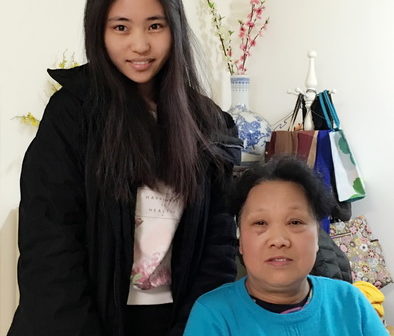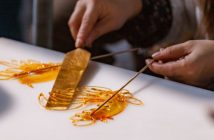
Studying in an American International School in Beijing, I’ve come to the realization that I should explore every aspect of the world, and not just America or Canada. Hence, I began exploring how China came into being, and how its capital, Beijing, became such an attraction, by reading and studying American literature on Chinese culture. Through this experience, I have discovered not only more about the history behind this fast developing country but also the history of my family in Beijing.
A few years ago in English class, I read the book The Red Scarf Girl written by Jiang Ji Li. I was intrigued not only by the content of the book but also about life in the 60s and 70s. The Red Scarf Girl is about a twelve year old girl – Jiang- who redefines herself during the Great Cultural Revolution of 1966. As people suffer, Jiang rides on a roller coaster of emotions that seems never-ending, and when it finally stops, her life is changed forever.
In order to learn more about the society and culture in the late 60s and early 70s, our teacher asked us to interview our grandparents about their lives during that time. My grandmother, who is a true Beijinger, has lived in Beijing since birth, and her parents (my great grandparents) have also been living in Beijing ever since they were young, so my family has had quite a long history in the city of Beijing. I interviewed her and was astonished to hear the difference between the Beijing she lived in and the Beijing today. It was an experience I will never forget.
Reading this interview again after four years, I have decided to share it in order to show what Beijing, a city I truly value, was really like during the 60s.
Can you briefly introduce yourself?
My family name is Yang, and I was born in 1951. As an individual born in the early 50s, I was seventeen years old at the beginning of the Cultural Revolution [which was in 1966]. My family was composed of my parents, two brothers, two sisters, and me. I was born in a peasant family, so we mainly ate coarse grains and focused on farming each day. We were important people back then because food depended on farmers.
What did you yearn for the most back in the 60s?
The conditions back then were not very good so there was not anything people had expected or wanted that badly. However, I really wanted to eat 橘子榜儿糖(orange candies), but one piece cost approximately 1-2 fen (1-2 cents). You can buy five with 1 mao (10 cents). We also really wanted to eat a type of pastry, called槽子糕(Cao Zi Gao) in Beijing dialect, which has changed dramatically from the 60s to now. One pound of the cakes was 6 mao. The problem was my family did not have the money to buy them because the money was spent on other useful things, such as paper, buckets, and other cooking ingredients. Those candies and snacks were not worth spending money on.
In 1968, what type of clothing did you wear on a daily basis?
In 1968, we dressed differently in that our clothes only came in green, black, or grey colors. We didn’t have any colorful or fashionable outfits as we have today. The year I turned seventeen, we either had short hair or two ponytails, one on each side of our heads. Most of us were members of the Red Guards, Mao’s youth association of the Cultural Revolution in China espousing Maoist principles, so we were urged to wear military green from head to toe.
Our uniforms consisted of hats, jackets, matching pants, and a belt which was buckled in the middle of our waists. In addition, we carried a green bag with a 校标 (school logo) over our shoulders. No one dared to curl their hair, wear makeup, or put on red lipstick. In a way, we felt proud of our natural beautiful style.
What was the most memorable moment at school or at work?
At school, we worked hard to learn math and Chinese literature. The ones who had a higher status graduated from high school or middle school and stepped into society. The ones who stood in a lower status had to either quit school at an early age, or just finish elementary school.
Lower families with many females suffered a lot because they devoted their time to earning money. Because of this, these women weren’t able to finish their education and they had to multi-task, meaning they had to earn money and cook for their family while men went out to earn money and finish their education. Most women had one wish, which was to attend college, but because they were poor, they couldn’t make their wishes come true. Most of the money earned supported the males at home because families had always believed men should work and women cook. This is why I only graduated from middle school.
What were your favorite hobbies that you engaged in during your free time, such as dancing, singing, drawing, etc.?
We didn’t’t have dance back then, because it counted as one of the four olds—old customs, old culture, old habits, and old ideas—all of which people were trying to eradicate during the revolution. We jumped rope(跳皮筋儿)and threw bean bags (扔沙包). Sometimes, we hung out with our friends or indulged in a good movie. One movie ticket cost 1mao, which was quite expensive for us. We watched movies such as白毛女 (The White-Haired Girl), 战斗的青春(Battle of Youth), and刘三姐(the Third Sister of Liu Family), and we also sang opera-like songs, such as 样板儿戏 and 度景山.
Did you like anyone specifically?
No, I didn’t like anyone. Our parents usually picked our partners and marriages for us, unlike nowadays where we can love whomever we want. Families never judged a book by its cover, rather, they judged it by how popular it was, and how much money the audience had spent on the book. Basically, we never judged or picked our partners by their appearances like we do today, rather we paid much more attention to whether this person could sustain a family or not.
Did you pick your husband or did your parents appoint you to him?
I was a young and naive girl, so my parents believed I should get married as soon as possible and start my own family like other girls in the neighborhood. Back in the days, my parents picked my husband for me. In the beginning, I wasn’t sure how I felt about him, but as time passed by, I began to except the fact that this was my life and he was my husband. He was such a sweet man and I’m so blessed to have him by my side.
How much money did you receive in a month? What are some things people bought?
We only earned around 120 RMB annually, so we basically only obtained 14-15 RMB monthly. The price of one telephone card was about the amount of money I earned in a year. The people who were wealthier earned about 20 RMB a month, but women usually earned 15-16 RMB. The price of one pack of cigarettes was pretty cheap, costing around 2 mao (20 cents) and 7 fen (7 cents). While today, you need around 100 RMB to a buy an entire box. A popsicle stick was about 5 fen (5 cents) and seafoodsuch as fish and shrimp cost 5 mao (50 cents) a pound, and pork cost 8 Mao (80 cents).
What did you enjoy playing back then that no longer exists today?
I would say jumping rope (跳皮劲). I wouldn’t say it’s extinct, but it’s definitely not popular these days. It’s not the long jump rope we have today, rather it was a robust rubber band which was tied to two trees and children would jump on and over it. We had our own chant that guided us through the process and made it a game. Another entertaining game we played was called Chua Guai which needed 3-4 players and goat bones. We would clean and dye these bones red, and later place them in a bag. Afterwards, the bag would be thrown and caught, then thrown and caught. The objective of the game was to see if you could catch the bag after it was thrown up. Thinking back, it was a great game for killing time.
Photo: courtesy of Jing Wen
Jing Wen is currently a junior at Tsinghua International School. She writes for the school newspaper, Spartan Times, and is a member of her school’s dance club. Outside school, Jing is passionate about life and loves socializing with different people from a variety of places. Through the student correspondence program, Jing hopes to share stories about her life, school, and her Beijing experiences with the rest of world!
The beijingkids student correspondent program provides a resource for guidance, feedback, and real-life training to high school students interested in writing and journalism. If you are a student interested in becoming a beijingkids student correspondent, or you know a student who is, please contact jessicasuotmaa@beijing-kids.com.




